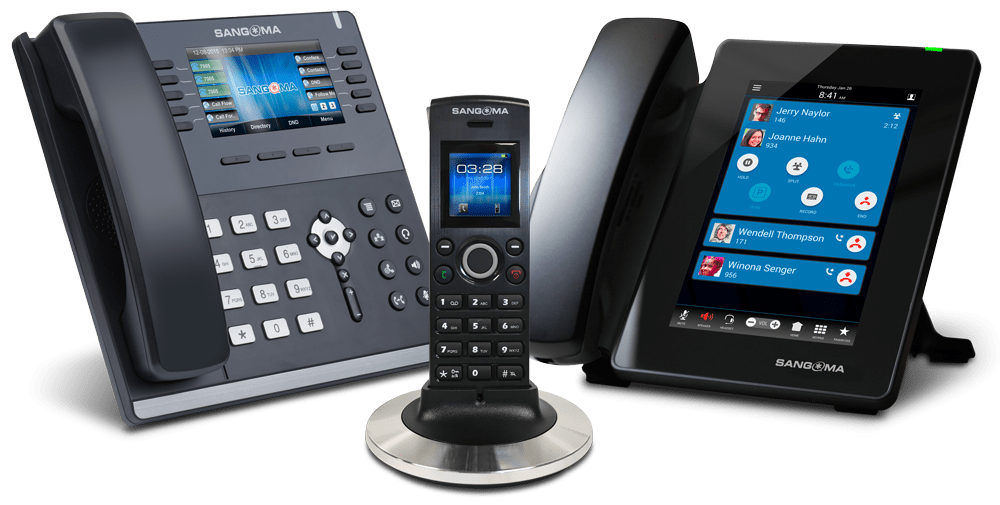Business VoIP allows users to make calls over internet-enabled devices. The user's voice is sent over the internet, as opposed to a PSTN, which makes traditional phone calls possible. VoIP calls are mostly in the cloud, but some systems may require certain types of VoIP equipment and hardware to operate. The hardware is what can transfer your existing phone system into one that is completely internet-based. This software can be installed on these devices in one of two ways — on-premise or hosted.
On-Premise Software vs. Hosted Software
On-premise software means that the solution is run on a local server or IT infrastructure located in your office. This allows for extra security and control over your software, but also tends to come with an extra cost of managing an in-house server. Hosted-software is the more common way to run your tools these days.
This means that a third-party provider houses the server for your business, and you can access it through the cloud. Taking this route means you can pay on an as-needed basis and scale your solution up or down as you please. Hosted solutions are becoming the more popular way to run your software as it's cost-effective and takes up less physical space in your office.
No matter which route you take, these processes are what will get your VoIP hardware up and running. In this article, we'll discuss the types of hardware you may need for your VoIP systems and the best vendors to purchase them from.
Types of VoIP Equipment
You’re going to need some additional hardware to get your phone service up and running. Here’s a list of some common items you may need:
Analog Telephone Adapter — This device, also known as an ATA allows you to use a standard phone to make calls over an IP network. An ATA is a vital piece of hardware for an IP phone.
Channel Bank — This device converts analog signals that typically travel over phone lines to digital signals that can travel over the internet.
Ethernet Cable — As mentioned above, this type of phone requires this cable to connect to the internet. The cable provides wired connections to the internet.
IP Phone — An IP phone, also known as a VoIP phone, is a physical phone system that utilizes VoIP technology instead of a traditional phone line. The phone connects to the internet through an ethernet cable that has plenty of internet bandwidth, which then connects to the IP address of your VoIP provider.
PoE Adapter — This device, also known as a PoE injector is what physically powers an Ethernet cable. The cable is plugged into the tool, which is then plugged into an outlet, allowing the cable to work.
Uninterruptible Power Supply (UPS) — This device is essentially a battery backup. Since IP calls rely on electricity and an internet connection, this will allow you to make a call in the event of a power outage.
VoIP Gateway — These gateways act as a bridge between a traditional phone infrastructure and a computer network. This device converts analog phone signals to SIP (Session Initiation Protocol) and vice versa. More robust gateways can up to 256 calls at a time.
VoIP Headset — These devices can be used in any VoIP call. They are headphones with a built-in microphone. This isn't a vital piece of hardware for your phone system, but it will allow you to go hands-free while you take a call.
IP PBX Server – An IP Private Branch Exchange (PBX) Server is the metaphorical center of your phone system. This device is a computer server that routes your call through the appropriate channel to connect you to the internet.
VoIP Router — A router directs internet traffic by passing data packets between computer networks. This is what connects your VoIP-enabled devices to the internet and is responsible for your call's quality and connectivity.
Keep in mind that you won’t need every one of these devices in order to implement a powerful VoIP phone system and take advantage of these top VoIP features. It all depends on the provider you go with.
Top VoIP Equipment Manufacturers
Here’s a list of some of the industry’s top VoIP equipment vendors:
ADTRAN
ADTRAN, founded by Mark C. Smith, has been providing telecommunication services and products to its customers for 35 years. ADTRAN announced that it had partnered with Orange Polska, Poland's largest telecommunications provider, to deliver high-capacity broadband services to their customers.
That's ADTRAN's mission — helping communications service providers around the world manage and scale services that connect people. The company does so through a variety of solutions and products. ADTRAN offers a line of various products, including gateways to help you transition to a VoIP system. These gateways include hybrid gateways, traditional SIP media gateways and IP business gateways.
Avaya
Avaya is a leader in cloud communications. Ever since its founding by Jim M. Chirico, Jr. in the year 2000, the company has been striving to shape the future of the modern-day office. As of 2017, their cloud communications solutions and multi-cloud application ecosystem is used by more than 1 million customers. Users include Jenny Craig, The Economist and the Golden State Warriors.
Avaya provides a vast of products, including a number of VoIP-enabled devices. Among that offering is their headsets, powered by their patented AcousticEdge Technology. That means you can enjoy clear audio and cancel out any outside noises to minimize distractions and boost productivity.
Cisco
Cisco, founded by Sandy Lerner and Leonard Bosack in 1984, is another leader in the space. The company went from a small group of computer scientists to nearly 71,000 employees to this day. Naturally, a company that big boasts some high profile customers, such as NASCAR, the LA Dodgers, and the Georgia Department of Public Health
Cisco is a leader in (IP)-based networking technologies, specifically areas of routing and switching, as well as in advanced technologies such as home networking, IP telephony, optical networking, security, storage area networking, and wireless technology. Cisco has set itself apart in the field through both software and hardware in this area. The organization offers a series of routers to optimize cloud application performance.
Clarity Voice
Clarity Voice is a North American telecommunications company that offers VoIP services and products to companies of any size. Their mission is to ensure reliable, efficient and cost-effective services to its customers. They have a nice list of clients, the most prominent of which being H&R Block. Clarity is known for the variety of phone solutions they offer their customers. Those solutions include physical business phones. Users can choose from a desk phone, cordless phone, or conference phone enhanced by Clarity Voice's patented technology.
ClearOne
ClearOne offers professional-level audio, video, and cloud collaboration solutions. The telecommunications company, founded in 1983, is committed to delivering high-quality hands-free audio for analog or VoIP environments. ClearOne offers a number of hardware devices to enhance their audio offering. They offer a USB speakerphone that is powered by ClearOne's HDConference audio to enhance customers' conferencing experience.
Flames Group
Flames Group is a VoIP traffic operator & equipment manufacturer founded in 2005 with a presence in more than five continents. The company's mission is to offer cost-effective GSM call termination software and hardware, which is used to keep routing a phone call over an IP network until it reaches its recipient.
ANTRAX is its core product. One of the devices ANTRAX offers is a GSM gateway to power VoIP calls. These gateways include a SIM server and GUI software, to ensure that users have full remote control of the gateway.
Grandstream
Grandstream is an award-winning telecommunications company that’s been around for nearly 20 years.They serve businesses of every size across the globe and offer IP voice, video, data and mobility solutions. Their devices are powered by Session Initiation Protocol (SIP), which is the protocol that makes VoIP possible. Among the devices offered is their wide range of IP phones. Customers can choose from different models, depending on their business size.
Jabra
Jabra is all about sound. The company is known for their headphones, putting them in the same league as Bose. Their headphones are powered by patented technology such as Active Noise Cancellation (ANC), SmartSound in-ear heart rate monitors, and microphones that use Artificial Intelligence (AI) to decide what sound to use and what to noise to filter out. Jabra offers a number of headphones compatible with VoIP phones, such as the Engage 75.
Logitech
When it comes to creating hardware, Logitech is a leader in the space. The company has been making headphones, speakers, and keyboards for nearly 30 years under multiple brand names. Logitech has received more than 250 design awards, including being listed in Fast Company’s “Top 10 Most Innovative Companies in Design” in 2018 and 2020. The Logitech Mobile Speakerphone P710e works with most mobile devices or computers.
Mitel
Mitel powers over two billion connections a day. The company, which has been around for almost 40 years, boasts some big-name customers like the Liverpool Football Club, Hyatt Hotels and the Pacers. Their business VoIP system, MiCloud Connect, was awarded one of the Best Business Tools of 2019. The company offers phones that integrate seamlessly with their VoIP offering, including the Mitel 6900 IP series.
Netgear
Netgear is a leader in the computer networking space. The company was founded by Patrick Lo, a Hong Kong migrant, in 1996. Before founding Netgear, Lo was a manager with Hewlett-Packard. Customers include Gamestream, Hawk-eye and R&M Distribution.
Netgear offers VoIP devices in a variety of verticals. Many of their business devices are designed to work over IP. Netgear offers an AV over IP tool to help bring down the costs of their customers’ AV solutions.
Panasonic
Panasonic is a worldwide leader in technology. The company was founded more than 100 years ago, offering solutions across a variety of industries, including automotive, entertainment, logistics and more. Notable customers include Disney, Pepperdine University and the Prudential Center. Panasonic offers a line of phones to ensure their users’ employees can work the way that is best for them.
Poly
Plantronics and Polycom merged to become Poly. The company combines forces to offer a full range of headsets, desk and conference phones, and video collaboration solutions. Its strong offering of headphones came from its parent company Plantronics.
The company was founded by United Airlines pilot Courtney Graham and his friend, fellow pilot Keith Larkin. United Airlines put out a call for a new design for smaller and sleeker headsets for their pilots. Graham and Larkin collaborated to create a design that was eventually accepted by the airline. Poly’s current headset offering includes their line specifically created for call center employees.
Ribbon Communications
Ribbon Communications, who recently merged with ECI Telecom Group, delivers communications software and solutions to businesses on a global level. Ribbon has thousands of customers across the globe. Their offerings are geared toward enterprises and service providers. Ribbon offers both hardware and software for its customer base. One such piece of hardware is their portfolio of media gateways to be used for a wide range of solutions.
Sangoma
Previously known as Digium, this telecommunications company offers a unified communications business phone system designed to make working from home a breeze. In light of the coronavirus pandemic, Sangoma decided to offer its video conferencing and collaboration tool for free.
One of Sangoma’s key offerings is its award-winning SIPStation SIP trunking service, which provides any company with the telephony services they need. A central product the company offers are desk phones. They offer features such as visual voicemail, HD audio and video conferencing.
Terratel
Terratel is a small European-based computer software and hardware company. They specialize in creating innovative solutions for telecommunications, telematics and industrial automation. Upgrading and integrating networks is one of their specialties. They offer multiple VoIP gateways to help their customers upgrade networks. The gateways support various protocols to ensure their customers have the best service possible.
Valcom
Valcom, Inc. is a leader in the design and manufacture of telecommunication systems and devices. The company was founded in 1977 and became an early pioneer of digital voice products, including ISDN software they designed for Motorola. They serve all industries but focus on higher education, healthcare facilities, military, and government applications. One of the tools Valcom offers a series of IP gateways that integrate with IP speakers and/or horns.
Yamaha
Yamaha-UC, previously known as Revolabs, offers audio and video conferencing solutions. The company offers a number of wired and wireless devices to provide superior audio quality, reliability and flexibility. Among those devices are their conference phones, which seamlessly integrate with a number of solutions.
Yeastar
Yeastar specializes in manufacturing gateways and PBX systems for small and mid-sized businesses. The company was founded in 2006 and boasts a global partner network and more than 200,000 customers. Their S-Series VoIP PBX systems come in a variety of models, all of which offer a number of features to ensure users can do work from anywhere.
Zyxel
Zyxel developed the world's first integrated 3-in-1 data/fax/voice modem in 1992 and hasn't stopped innovating since then. The company has won a number of awards in its 30-yearhistory, including 2019's Best Taiwan Global Brands. The company has a client base that expands around the world. One of the categories of products they offer are powerline and adapters, which transform your existing wall power outlets into an IP network.




